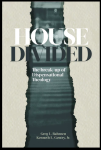THE INTERMEDIATE STATE
PMW 2023-007 by Kenneth L. Gentry, Jr. 
I have long attempted to maintain three fundamental practices in my life: (1) Never engage in a ground war in Asia. (2) Never attempt to go to Chick Fil-A at lunch time (the place is so crowded nobody goes there any more). (3) Never engage in theological debate on Facebook, for you will experientially learn the meaning of “eternity” with unending threads. Yet, I have stumbled and have been tempted above that which I am able. I allowed myself to be drawn into the FB equivalent of eternal life. Woe is me.
One problem (among many!) that one must endure on Facebook is tracing out arguments in long threads of random thoughts by various people at diverse times, then later trying to remember where you saw them. Ugh. So, instead of hunting and finding the thread that dealt with my (Reformed) observation that man is a body-soul complex, I will quickly offer the following in response to those who do not like the idea of a physical resurrection — wherever that thread may now exist. Though, were I of sound mind and body I would simply refer my challengers to any Reformed Systematic Theology.
House Divided: The Break-up of Dispensational Theology By Greg Bahnsen and Ken Gentry
By Greg Bahnsen and Ken Gentry
This book presents and defends Christian Reconstruction theology, particularly theonomic ethics and postmillennial eschatology. It does to by responding to dispensationalism’s social and exegetical theology.
For more educational materials: www. KennethGentry.com
God created man as a body-soul being, i.e., as a physical and spiritual unity (Gen. 2:7). This is the major reason God redeems us by sending his Son in a physical body to die for us (Heb. 2:14–15; 10:5). And this is one reason that the unbeliever is to be judged in soul AND body under the wrath of God in the fullness of his (the unbeliever’s) being (Matt. 10:28). Man exists in his full integrity as God designed him only when body and soul (the physical and spiritual aspects of his being) are united.
Nevertheless, man can and does exist while body and soul are separated. Though the center of man’s being is his soul-spirit, he continues to exist in his spirit after death, when body and soul are separated. Spirits do exist without bodies, which is why Jesus encouraged his disciples after his physical resurrection by saying: “See My hands and My feet, that it is I Myself; touch Me and see, for a spirit does not have flesh and bones as you see that I have” (Luke 24:39). After all, for the Christian “to be ABSENT from the body” is “to be at home with the Lord” in heaven (2 Cor. 5:8). That state of being is rightly called an “intermediate” state, for it is “between” two states of existence. It is temporary and not in keeping with the fullness of God’s creation design and purpose. It is, however, preferable to life in this sinful world (Phil. 1:23; cp. 2 Cor. 5:8).
At death we endure the separation of our soul from our body. During this intermediate time we are waiting for the redemption of our body (Rom. 8:19–23), which will be raised (2 Cor. 4:14) in the future when the whole creation is finally and forever no longer “subjected to futility” in “its slavery to corruption” while it “groans and suffers” (Rom. 8:20–22). This has not happened yet. But it will happen at the end of history (1 Cor. 15:23–26) when our bodies will be transformed from corruptible to incorruptible after we have waited for his return (1 Cor. 15:51–54; Phil. 3:20–21).

Blessed Is He Who Reads: A Primer on the Book of Revelation
By Larry E. Ball
A basic survey of Revelation from an orthodox, evangelical, and Reformed preterist perspective. Ball understands John to be focusing on the destruction of Jerusalem and the temple in AD 70. Insightful. Easy to read.
For more Christian studies see: www.KennethGentry.com
Kenneth L. Gentry Jr.'s Blog
- Kenneth L. Gentry Jr.'s profile
- 85 followers



